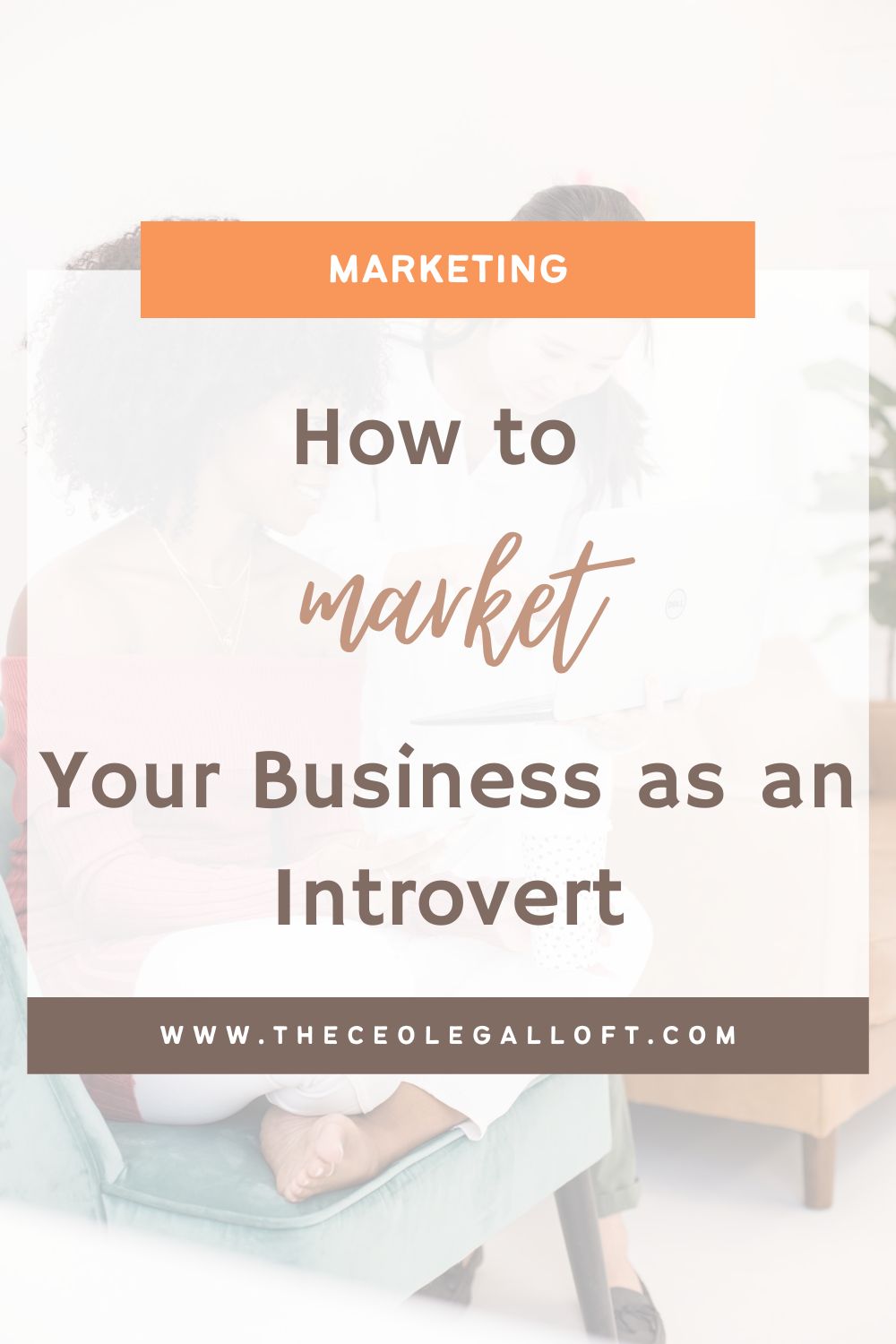Great! You’ve created your digital product or launched your business, but you’re wondering why the sales notifications are coming in like molasses. Getting these sales are exciting, but you want to take it to the next level, but the idea of promoting your product, service, or digital product leaves you feeling anxious and overwhelmed. And every marketing guru is encouraging you to hop on the social media train, but you are not interested in leaving a large digital footprint.
But fear not! The marketing strategies I talk about can work for anyone, including those who prefer a quieter approach. Networking events may not be your thing, but have you considered reaching out to your existing network? Or maybe email marketing is more your speed. The point is, social media is not the only form of marketing to get your digital product or business out there. We’ll show you how to leverage your strengths as an introvert to successfully market without social media.
Table of Contents
- Self doubt when marketing
- Overcoming self-doubt to market your business
- How to market your business without social media
- Marketing on social media without showing your face
Why Self-Doubt is a Common Hurdle for Small Business Owners When Marketing
As a small business owner, it’s easy to fall into the trap of self-doubt.
You may find yourself comparing yourself to others in the market. But remember, there’s room for everyone! Rather than focusing on what your competitors are doing, focus on what makes your product or service unique and how it can benefit your target audience.
Sometimes, fear is what’s stopping you, but it’s important to remember that failure is a natural part of the process. Embrace it, learn from it, and use it to grow and improve. Remember, even the most successful businesses have experienced failure at some point.
Maybe you’re having trouble figuring out who to sell your product or service to and how they want to be marketed to. Defining your target audience is challenging, but it’s essential for effective marketing. Take the time to research and understand your audience’s needs, preferences, and pain points. This will help you create targeted and effective marketing strategies that resonate with your audience.
It’s common to feel unprepared or unqualified when it comes to marketing your business. But here’s the secret: no one knows your product or service better than you do! Take the time to learn about digital marketing, identify your strengths, and create a plan that leverages them. You’ve got this!
Overcoming Self-Doubt To Market Your Business
Overcoming self-doubt is a crucial step in effectively marketing your business Here are a few things to help you feel confident with your marketing.
Start with a solid understanding of your target audience. Like I said before, start by understanding your target audience. Take the time to research and understand their needs, preferences, and pain points. This will help you create targeted and effective marketing strategies that resonate with your audience.
Next, develop a comprehensive marketing plan. A well-planned marketing strategy can help you overcome self-doubt and achieve marketing success. When you know exactly what to do and when to do it, it makes it that much easier to market. Consider both traditional and alternative marketing tactics, and create a roadmap that aligns with your goals and budget.
While social media can be a powerful marketing tool, it’s not the only option. Consider email marketing, blog writing, or Pinterest as alternative options that align with your target audience and product. These channels can be particularly effective for driving traffic and generating leads, without the pressure of “showing up” online. However, if you want quick results, you may want to start on social media and send them to your non-social media marketing channel(s). Once you’ve decided enough is enough, you can taper off your social media efforts.
Speaking of social media, I know it can be overwhelming for introverts, but it doesn’t have to be. Focus on platforms that align with your target audience, and create a content strategy that plays to your strengths. Whether it’s through thoughtful captions or curated visuals, there are ways to succeed on social media without sacrificing your comfort zone.

How to market your business without social media
Now for the good stuff! Here are 5 ways to market your business without using social media.
Email Marketing
Email marketing is a great way to grow your business without social media. It’s a way to reach your target audience without the pressure of in-person networking. Consider growing an email list, and creating a newsletter or promotional emails that provide value to your subscribers, such as discounts or exclusive content. Email marketing automation allows you to send targeted messages to your subscribers based on their behavior or interests. Consider setting up automated campaigns that welcome new subscribers, promote your product, or offer exclusive discounts.
If you’re not sure how to get started with email marketing, check out Liz Wilcox. I’m a member of her amazing and low cost ($9) email marketing membership. When you join, every Monday, you’ll get an email from her with an email template you can use to send your list and video on how to utilize the template. Her emails can be used for all industries and I highly suggest you check it out. >> Join Liz Wilcox’s Email Marketing membership (this is an affiliate link and I’ll be a paid a commission if you join)
Blogging
Whether you know it or not, BLOGGING IS NOT DEAD. According to LinkedIn, 77 % of internet users read blogs.
Blogging is a great way to showcase your expertise and connect with potential customers. Blogging allows you to showcase your expertise and connect with your target audience in a way that is comfortable and low-pressure. Introverts tend to thrive in situations where they have time to reflect and prepare, and blogging provides just that.
By writing blog posts on topics that you are knowledgeable and passionate about, you can communicate your message in a way that feels authentic and natural. Unlike in-person networking, where you may feel pressured to make a strong impression on the spot, blogging allows you to take your time and craft your message carefully.
Additionally, blogging is an effective way to attract potential customers to your website without the need for self-promotion or aggressive marketing tactics. By creating valuable content with targeted keywords that addresses the pain points and questions of your target audience, you can position yourself as a helpful and trusted resource, which can ultimately lead to increased conversions and sales.
Leverage referrals through an affiliate marketing program
Word of mouth will always be the best tool for your business. And you can use affiliate marketing to leverage your referrals and drive sales for your small business. Here’s how it works: you partner with other websites or influencers in your niche, who promote your product to their audience. In exchange, you offer them a commission on any sales made through their unique referral link.
One of the benefits of affiliate marketing is that it allows you to reach a wider audience than you might be able to on your own. By partnering with established websites or influencers in your niche, you can tap into their existing audience and gain exposure to potential customers who may not have found you otherwise. Additionally, because affiliates are only paid a commission on successful sales, they are motivated to promote your product in a way that feels authentic and helpful, rather than pushy or aggressive.
One of my favorite tools for affiliate marketing is Thrivecart (this is an affiliate link and I’ll be a paid a commission if you join). You’ll get a checkout system that seamlessly integrates with your affiliate marketing program. You’ll be able to provide links, track your affiliates, and pay them out with this one system.
If you already have an audience, you can invite them to be referrals through the purchase confirmation email or inside of your digital product.
Become a sponsor
Sponsoring an event can be a powerful way to increase brand awareness and connect with potential customers who are already interested in your niche or industry. Depending on your budget, there are a few different options for event sponsorship.
If you have a larger budget, you may be able to sponsor a major industry conference or trade show. These events attract a wide range of attendees and provide a great opportunity to showcase your product and connect with potential customers. As a sponsor, you may have the opportunity to host a booth or table, distribute promotional materials, or even give a presentation on your product or industry.
If your budget is more limited, you may want to consider sponsoring a smaller event, such as a local networking event or workshop. These events can be more targeted and may attract attendees who are specifically interested in your niche or industry. As a sponsor, you may have the opportunity to provide promotional materials or even host the event yourself.
In the past, my small business sponsored my niece’s Girl Scout cookie drive, and would love to find summits and online events that I could sponsor in the future.
Before deciding to sponsor an event, it’s important to do your research and make sure it aligns with your target audience and marketing goals. Consider the demographics of the attendees, the cost of sponsorship, and the potential ROI in terms of brand awareness and lead generation.

Collaborations
Collaborating with other business owners who share your audience is one of my favorite ways to market. Collaborating with other business owners can be a powerful way to reach a wider audience and promote your business. One effective way to do this is by creating a video presentation that showcases your product and expertise, and collaborating with other business owners to share it with their audience.
To get started, identify businesses in your niche or industry that share your target audience and would be willing to collaborate with you. Consider reaching out to them via email or social media, and explain the benefits of collaboration, such as increased exposure and potential leads.
Once you’ve identified collaborators, work together to create a video presentation that highlights the value of your product and offers actionable tips or advice related to your niche. Be sure to keep your target audience in mind and make the content engaging and relevant to their needs.
Once the video is complete, work with your collaborators to promote it to their audience. This might include sharing the video on social media, including it in a newsletter, or featuring it on their website or blog. By leveraging the existing audience of your collaborators, you can reach a wider audience and attract potential customers who may not have found you otherwise.
Marketing on social media without showing your face
If you don’t mind being on social media but don’t want to show your face, here’s some options:
Use images like carousels or infographics
When it comes to promoting on social media, using visuals like carousels and infographics can be a game changer. With carousels, you can share multiple images or pieces of content in a single post, making it easier to showcase the features and benefits of your product. And with infographics, you can present information and data in a highly shareable and engaging way.
By using carousels and infographics on social media, you can market in a way that is visually engaging and shareable. And the best part? You don’t have to show your face to do it! So why not give it a try and see how it works for you?
Use Pinterest
Pinterest can be a highly effective way to drive traffic to your website and promote your product without showing your face. Pinterest is basically a visual search engine. Consider creating eye-catching pins that highlight the benefits and features of your product, and include a link to your website or product page. You can also use Pinterest to create boards that showcase your product in different settings or use cases, which can help to inspire potential customers and build brand awareness.
Pinterest like SEO is a long game. Don’t expect results overnight. Only a few months ago, I had one of my posts go viral and now it’s bringing in a big chunk of my traffic (more than IG and TikTok now!). But I’ve been utilizing Pinterest for 2 years before that happened.

Use audiograms
If you have a podcast, are on podcasts as a guest, or have audio clips from a digital product you sell, you can use those on social media. You won’t have to show your face but your audience will feel more connected by hearing your voice. Whether you’re highlighting key messages or repurposing existing content, audiograms can be a highly effective tool for marketing your product without showing your face.
Why you should use offline market strategies to promote your business
Even if social media isn’t your thing, it’s very possible to promote and grow a business without using social media. By leveraging alternative marketing strategies such as event sponsorship, collaborations, and email marketing, you can reach your target audience and build brand awareness without relying on social media platforms. So why not give it a try and see how it works for your business?
Looking for more strategies to market your business and/or digital product while being an introvert? Then look no further than Ready, Set, Market Your Digital Product! In this mini-course, I dive deeper into what I’m doing to make more sales, plus I give you some resources so you can collaborate with others who have your target audience. It’s packed with 10 effective and actionable tips on how to market your digital product, both with and without social media and I discuss the legal considerations you need to keep in mind while marketing your digital product. And the best part? It’s introvert-friendly, so you can promote your product in a way that feels authentic and comfortable for you.

Great content to help those of us trying to diversify our marketing or shift away from social media!
Thanks! Glad it was helpful.
Great tips – especially the email marketing. Thanks for sharing!
You’re welcome and thanks for reading!